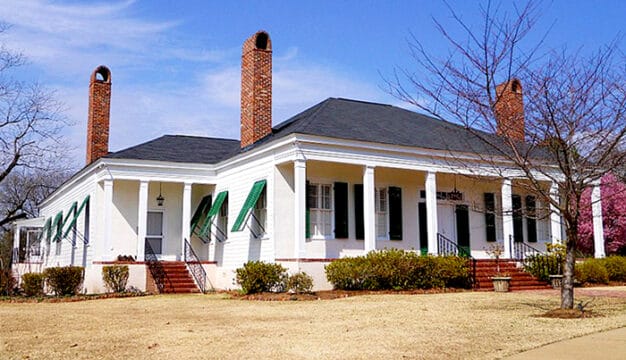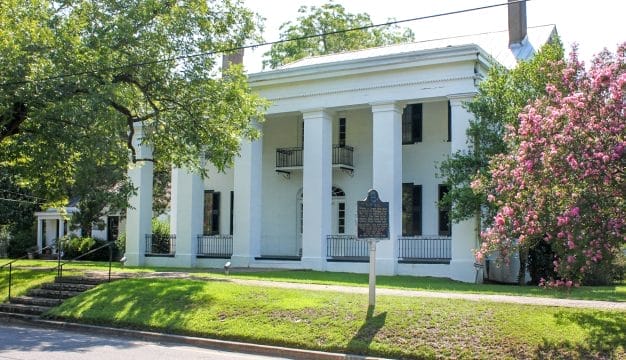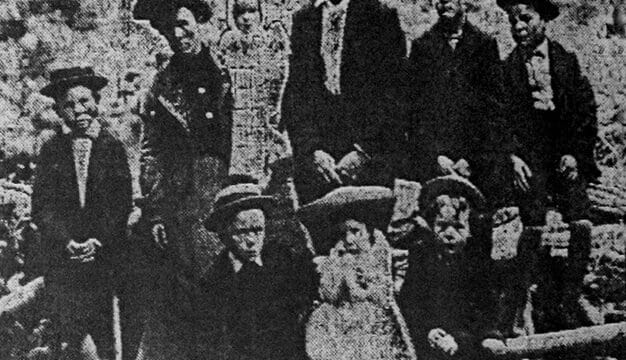Hudson Strode
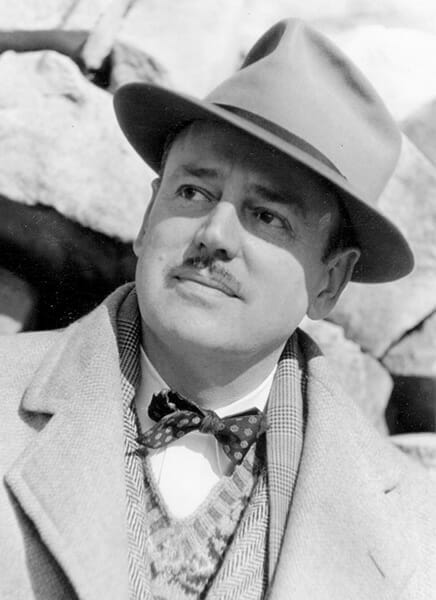 Hudson Strode
Hudson Strode (1892-1976), although a prolific author in his own right, is best remembered for his creative writing classes at the University of Alabama, in which he nurtured a number of writers who eventually produced more than 50 published novels and 100 short stories among them. The bulk of Strode’s published work took the form of travel writing, but his best-known work is a three-volume biography of Confederate president Jefferson Davis.
Hudson Strode
Hudson Strode (1892-1976), although a prolific author in his own right, is best remembered for his creative writing classes at the University of Alabama, in which he nurtured a number of writers who eventually produced more than 50 published novels and 100 short stories among them. The bulk of Strode’s published work took the form of travel writing, but his best-known work is a three-volume biography of Confederate president Jefferson Davis.
Strode was born on October 31, 1892, in Cairo, Illinois, to Thomas Fuller Strode, a native of Huntsville, Madison County, and Hope Hudson Strode. The family moved to Denver, Colorado, when Strode was about three after his father’s physician recommended the dry mountain air for his father’s tuberculosis. Despite the move, his father died in 1896 and was buried in Kentucky. Hope Strode took a teaching position at Clinton College in Kentucky. While visiting relatives in West Point, Mississippi, Hope met and married Rane McMillen and settled with him in West Point; the couple would have two daughters. The family moved to Demopolis, Marengo County, when Strode was 12.
After graduating from high school in 1909, Strode attended the University of Alabama, majoring in English. He graduated in 1913 and tried unsuccessfully to find a position teaching high school English in Demopolis for a year. Instead, he enrolled in Columbia University to pursue an M.A. in English; he chose Columbia over other universities so that he could frequent the theater in New York City. He completed his degree in just nine months and then taught at Syracuse University in Syracuse, New York, as an instructor for two years. Turning down an instructor position at Yale University in Connecticut, Strode returned to the University of Alabama in 1916 as an associate professor to teach Shakespeare.
When World War I broke out, Strode was classified as unfit for duty, so he contributed to the war effort by producing plays and vaudeville entertainment through the YMCA for troops at the Naval Air Station in Pensacola, Florida. After surviving a case of influenza during the deadly pandemic of 1918, he went to Carmel, California, to recuperate, where he met literary legends Eugene O’Neill and Van Wyck Brooks. He returned to his teaching at the University of Alabama in 1919, then in 1922 took an unpaid leave of absence to travel in Europe.
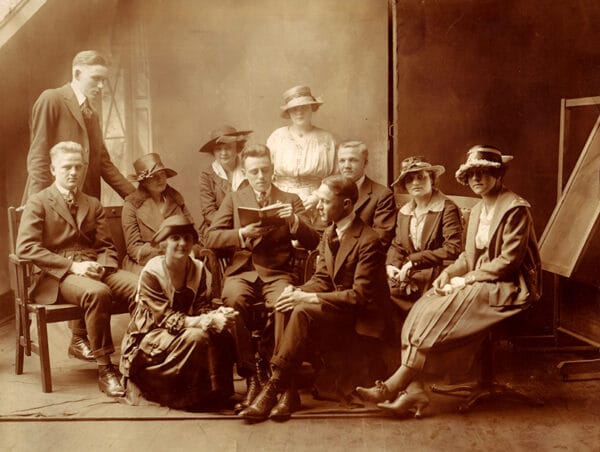 Hudson Strode Class, ca. 1920
Strode married Therese Cory on December 20, 1924, after his return to Alabama. While enduring difficulties with his sight brought on by overwork, Strode also suffered a nervous breakdown in 1926. After his recovery, he spent the summers of 1927 and 1928 writing at the McDowell Colony in Peterborough, New Hampshire, a retreat for writers. A second nervous breakdown and another bout with the flu led to a three-year stay in Bermuda and resulted in the first of Strode’s travel-related books, The Story of Bermuda (1932), followed by books on Cuba (1934), Finland (1941), Mexico (1944), Sweden (1949), and Denmark (1951). While in Bermuda, Strode also met and befriended renowned British author and poet Rudyard Kipling, whose wife was hospitalized in Bermuda after becoming ill on a cruise.
Hudson Strode Class, ca. 1920
Strode married Therese Cory on December 20, 1924, after his return to Alabama. While enduring difficulties with his sight brought on by overwork, Strode also suffered a nervous breakdown in 1926. After his recovery, he spent the summers of 1927 and 1928 writing at the McDowell Colony in Peterborough, New Hampshire, a retreat for writers. A second nervous breakdown and another bout with the flu led to a three-year stay in Bermuda and resulted in the first of Strode’s travel-related books, The Story of Bermuda (1932), followed by books on Cuba (1934), Finland (1941), Mexico (1944), Sweden (1949), and Denmark (1951). While in Bermuda, Strode also met and befriended renowned British author and poet Rudyard Kipling, whose wife was hospitalized in Bermuda after becoming ill on a cruise.
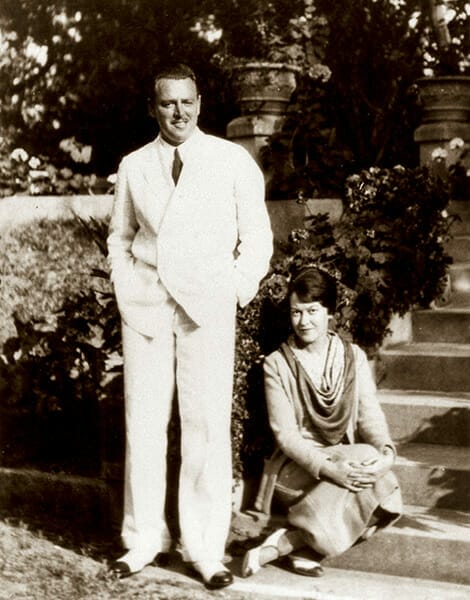 Hudson and Therese Strode
Strode returned to UA in 1932. In 1936, at the urging of his student Harriet Hassell, Strode began to allow his students to work on novels in class. Hassell’s own best-selling novel, Rachel’s Children (1938), was the first to be published from Strode’s course, which became a crucible for many aspiring writers for 25 years. Beginning officially as a creative writing class in 1938, by 1945 Strode’s students had produced 10 novels, and upwards of 300 people applied for the 14-member class every year. Well-known alumni of the class included Elise Sanguinetti, Helen Norris, Ann Waldron, and Lonnie Coleman.
Hudson and Therese Strode
Strode returned to UA in 1932. In 1936, at the urging of his student Harriet Hassell, Strode began to allow his students to work on novels in class. Hassell’s own best-selling novel, Rachel’s Children (1938), was the first to be published from Strode’s course, which became a crucible for many aspiring writers for 25 years. Beginning officially as a creative writing class in 1938, by 1945 Strode’s students had produced 10 novels, and upwards of 300 people applied for the 14-member class every year. Well-known alumni of the class included Elise Sanguinetti, Helen Norris, Ann Waldron, and Lonnie Coleman.
Strode next turned his attention to a three-volume biography of Jefferson Davis, which he published in 1955, 1959, and 1964, followed by an edited collection of Davis’s letters in 1967. Although generally well-received, some critics thought him too sympathetic toward Davis. For Strode’s work on Sweden, King Gustav Adolf of Sweden made him a Knight of the Royal Order in 1961. Strode retired from teaching in 1963. His memoir, The Eleventh House (1975), covers his life up to the beginning of World War II in Europe in 1939.
Strode died on September 22, 1976.
Works by Hudson Strode
Story of Bermuda (1932)
The Pageant of Cuba (1934)
South by Thunderbird (1937)
Immortal Lyrics (1939)
Finland Forever (1941)
Timeless Mexico, a History (1944)
Spring Harvest: A Collection of Stories from Alabama (1944)
Now in Mexico, A Book of Travel (1947)
Sweden: Model for a World (1949)
Denmark Is a Lovely Land (1951)
Jefferson Davis, Volume I: American Patriot (1955)
Jefferson Davis, Volume II: Confederate President (1959)
Jefferson Davis, Volume III: Tragic Hero (1964)
Jefferson Davis: Private Letters 1823-1889 (1967)
Ultimates in the Far East: Travels in the Orient and India (1973)
The Eleventh House: Memoirs (1975)
Additional Resources
Rountree, Thomas. “Hudson Strode: the Legend and the Legacy.” Alabama English 2 (Spring 1990): 17-24.
